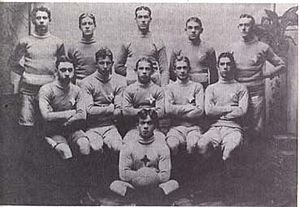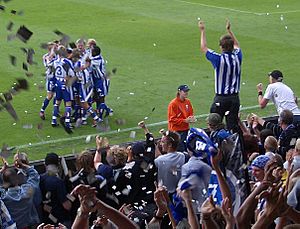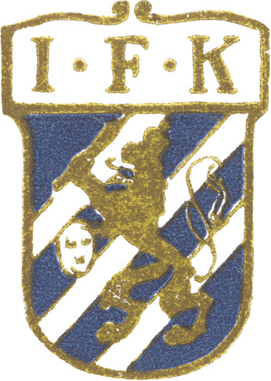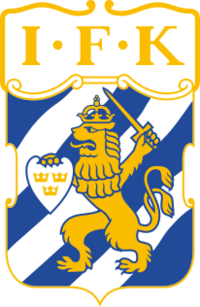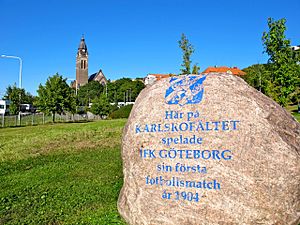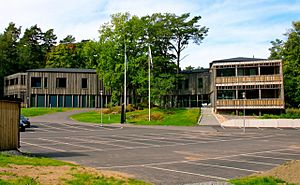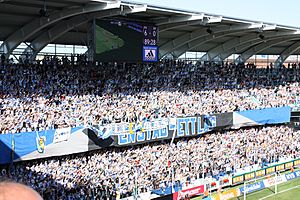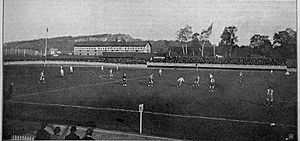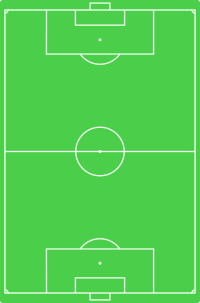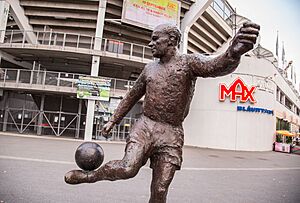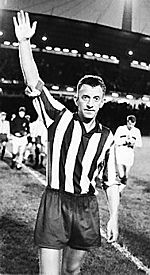IFK Göteborg facts for kids
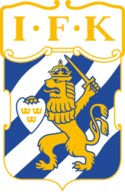 |
||
| Full name | Idrottsföreningen Kamraterna Göteborg (officially IFK Göteborg Fotboll) | |
|---|---|---|
| Nickname(s) |
|
|
| Short name | IFK | |
| Founded | 4 October 1904 | |
| Ground | Gamla Ullevi, Gothenburg | |
| Capacity | 18,454 | |
| Owner | Member-owned | |
| Chairman | Magnus Nilsson | |
| Head coach | Stefan Billborn | |
| League | Allsvenskan | |
| 2024 | Allsvenskan, 13th of 16 | |
|
|
||
IFK Göteborg is a professional football club from Gothenburg, Sweden. It was started in 1904. The club is famous for being the only team in the Nordic countries to win a major UEFA competition. They won the UEFA Cup twice, in 1982 and 1987.
IFK Göteborg plays its home games at Gamla Ullevi. Their team colors are blue and white, which is why they are often called Blåvitt (Blue-white). These colors come from the city's coat of arms.
The club has won 18 Swedish championship titles. This is the second-highest number in Swedish football. They also have eight national cup titles. IFK Göteborg has played in the UEFA Champions League group stages four times. In 1986, they reached the semi-finals of the European Cup.
IFK Göteborg plays in Allsvenskan, Sweden's top football league. They have been in the top league since 1977, which is the longest time for any Swedish club. Their best period was from 1982 to 1996. During these years, they won 10 Swedish championships and had great success in Europe.
Contents
Club History: From the Start to Today
IFK Göteborg was founded on October 4, 1904, in Gothenburg. It quickly became an important club for football in the city. Before IFK, Örgryte IS was the main team. IFK Göteborg brought new competition.
In 1907, IFK Göteborg beat Örgryte IS for the first time in four years. They won their first Swedish Championship in 1908. Three players from the club were chosen to play for Sweden in the national team's first game.
In 1910, the team started wearing their famous blue and white striped jerseys. Newspapers in Stockholm called IFK Göteborg "the best Swedish football club ever" in 1912. They won Svenska Serien, the top league at the time, five times in a row by 1917.
The first official Swedish national league, Allsvenskan, began in 1924. A famous player named Filip Johansson joined IFK Göteborg that year. He scored 39 goals in 22 games, becoming the league's top scorer.
IFK won their first Allsvenskan title in 1934–35. They were surprisingly relegated in 1937–38 but quickly returned to the top league the next season. They won another title in 1941–42. A talented player, Gunnar Gren, played for IFK in the 1940s. He won an Olympic gold medal with the Swedish team in 1948.
In 1958, IFK played in a European Cup for the first time. In 1959, a record 52,194 fans watched IFK play Örgryte IS at Nya Ullevi.
After a quiet period, IFK won a surprising championship title in 1969. But the next season, they were relegated again. It took them several years to get back to Allsvenskan, which they did in 1976.
In 1979, Sven-Göran Eriksson became the manager. He brought in a new playing style that led to great success. His first season ended with a second-place finish in Allsvenskan and their first Svenska Cupen gold medal.
The year 1982 was amazing for IFK. Even though the club almost went bankrupt, they won every competition they entered. This included Allsvenskan, Svenska Cupen, and the UEFA Cup. They beat Hamburger SV 4–0 in the UEFA Cup final. For the next 15 years, IFK was the top club in Swedish football. They won 10 Swedish championships and two more UEFA Cups.
In 1986, the team reached the semi-finals of the European Cup. A new group of talented players won both the UEFA Cup and Allsvenskan again in 1987. The youth manager Roger Gustafsson took over in 1990. Under him, IFK won Allsvenskan five times between 1990 and 1995.
In 1993, IFK qualified for the UEFA Champions League group stage. They were expected to lose against teams like FC Barcelona and Manchester United. But IFK Göteborg surprised everyone by winning their group and moving on to the knockout stage. They were later knocked out by Bayern Munich.
The late 1990s were not as successful. The club struggled and changed managers often. The new millennium brought mixed results. They almost faced relegation in 2002 but also challenged for the championship in other years. In 2007, they won their first title in eleven years. They then won the national cup in 2008. IFK Göteborg is still seen as one of the "Big Three" clubs in Sweden.
Team Colors and Club Badge
Colors and Kit
The traditional colors for all IFK clubs are blue and white. IFK Göteborg uses these colors too. When the club started in 1904, they wanted blue and white striped shirts. But these were too expensive. So, their first kit was a blue shirt with a white stripe and a white four-pointed star.
In 1910, they finally started using the blue and white vertically striped shirts with blue shorts. This design has been their home kit ever since. The team's away kits have often been red and white. Sometimes, other colors like orange or pink have been used.
|
|
|
|
Club Badge
The IFK Göteborg club badge comes from the city of Gothenburg's coat of arms. It features a lion holding the Three Crowns of Sweden. This design was given to Gothenburg by King Gustavus Adolphus. IFK chose to have the lion face the right side, which is the usual way for a lion in heraldry. The letters IFK were added on top.
This badge has been used since 1919. Its main parts have not changed much over the years. In the early 1980s, the club made the design standard. Small updates were made in 2020 to make it clearer and to update the blue color.
Sponsors
Kappa has been the club's kit maker since 2016. Before that, Adidas supplied the kits for many years.
The team's shirts and shorts also show logos from different companies. These include Serneke (a construction company), Elkontakt (electrical contractor), Morris Law (a law firm), Atea (IT company), Länsförsäkringar (insurance and bank), Rasta (restaurants), Volkswagen (car makers), and Svenska Spel (gambling company).
ICA, a grocery store chain, sponsored IFK Göteborg from 1974 to 2010. Their logo was on the shirt for a long time.
Training Grounds and Stadiums
Training Facilities
IFK Göteborg played its very first match at Karlsrofältet in 1904. A special stone is there to remember this event. Karlsrofältet was mainly used for training until 1910.
Since 1961, the club's main training facility has been Kamratgården. It has grown over the years with more buildings and pitches. In 2012, a new, modern facility was opened at Kamratgården.
The club's football academy and Änglagårdsskolan, a school linked to IFK, are at Prioritet Serneke Arena. This is a large sports complex with an indoor football pitch.
Home Stadiums
IFK Göteborg's main home stadium has usually been Gamla Ullevi. They played there for many years. For bigger games, like against rivals or international matches, they used the larger Nya Ullevi stadium.
The old Gamla Ullevi was taken down in 2007 to build a new stadium with the same name. The new Gamla Ullevi opened in 2009. It can hold 18,800 fans. During construction, IFK Göteborg played at Nya Ullevi. On April 11, 2009, IFK Göteborg played their first game at the new Gamla Ullevi and won 6–0.
The club has used other stadiums too. Their first home ground was Idrottsplatsen from 1905 to 1915. They also used Balders Hage and Walhalla Idrottsplats for some games.
Fans and Club Connections
Supporters
When IFK Göteborg was founded, Örgryte IS was the main club in Gothenburg. Örgryte was seen as a club for the middle and upper classes. IFK became popular with the working class. This created a strong rivalry between the clubs.
In the early 1900s, fans were expected to be polite. But IFK and Örgryte fans sometimes fought, which made the Swedish newspapers call them "the scum of Swedish football." After World War I, things calmed down.
Swedish football fan culture changed in the late 1960s, inspired by English fans. This led to the creation of well-known fan clubs. IFK Göteborg's fan club, Änglarna (the Angels), was officially started in 1973.
When the club had success in Europe in the 1980s and 1990s, thousands of IFK fans traveled to watch games. The fans even helped the club financially when it was in trouble in 1982.
In the 2000s, Swedish fan culture started to be more like Southern European football. This meant more tifos (big fan displays) and ultras groups. IFK Göteborg is the most popular football club in Sweden. Surveys in 2016 and 2017 showed that 10% of Swedish football fans supported IFK.
Since 2009, the club's entrance song is "Snart skiner Poseidon" ("Soon Poseidon will shine"). This song refers to a famous statue in Gothenburg.
Club Relationships
IFK Göteborg is part of Göteborgsalliansen, an alliance with two other Gothenburg teams: GAIS and Örgryte IS. They sometimes work together on projects. In 2015, IFK started a partnership with Utsiktens BK. This allows IFK players to be loaned to Utsiktens BK to get more playing experience.
Players
First-team Squad
|
|
Players on Loan
|
Youth Players with First-Team Experience
|
|
Famous Players
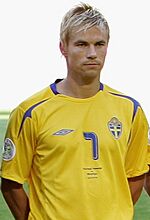
Many great players have played for IFK Göteborg. Some of them are:
- Filip Johansson: A top scorer in the early Allsvenskan years.
- Gunnar Gren: A very talented forward who won an Olympic gold medal.
- Bertil Johansson: Scored many goals for the club.
- Torbjörn Nilsson: One of the most famous players from the successful 1980s team.
- Glenn Hysén: A strong defender from the golden era.
- Thomas Ravelli: A well-known goalkeeper.
- Magnus Erlingmark: A versatile player who played many positions.
- Niclas Alexandersson: Played many matches for the Swedish national team.
- Marcus Berg: A forward who played for the club in two different periods.
Fans' Player of the Year
The supporters' club, Supporterklubben Änglarna, gives an award called "Ärkeängeln" ("The Archangel") every year. It's for a player who shows great loyalty and sporting achievements. A player can only win it once. Since 2023, players from the women's team can also win this award.
Some of the winners include:
- 1979 – Torbjörn Nilsson
- 1981 – Glenn Hysén
- 1991 – Thomas Ravelli
- 1997 – Magnus Erlingmark
- 2004 – Niclas Alexandersson
- 2009 – Tobias Hysén
- 2022 – Marcus Berg
- 2023 – Gustav Svensson
Club Management
Board Members
The club is owned by its members. Here are some of the people on the board:
- Magnus Nilsson (Chairman)
- Teresa Utković (Vice Chairman)
- Lars Dahlström (Secretary)
- Philip Haglund (Board member)
Club Organization
These people help run the club day-to-day:
- Håkan Mild (Club director)
- Sofia Hultberg (Operations manager)
- Jesper Jansson (Head of football)
- Hannes Stiller (Sporting director)
- Oscar Wendt (Assistant sporting director)
- Jonas Olsson (Director of youth academy)
Coaching Staff
The coaches and other staff who work directly with the team are:
- Stefan Billborn (Head coach)
- Joachim Björklund (Assistant coach)
- Marcus Berg (Assistant coach)
- Lee Baxter (Goalkeeping coach)
- Hakeem Araba (Strength and conditioning coach)
Famous Managers
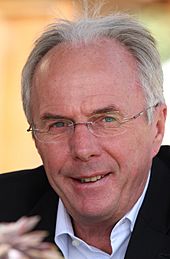
Many important managers have led IFK Göteborg. Some have won major trophies, and others have managed many league matches.
- Eric Hjelm: Won the Allsvenskan title in 1934–35.
- Ernst Andersson: Won the Allsvenskan title in 1941–42.
- Walter Probst: Won the Allsvenskan title in 1957–58.
- Bertil Johansson: Led the team to a championship in 1969.
- Sven-Göran Eriksson: Managed the team from 1979 to 1982. He won two Svenska Cupen titles and the UEFA Cup in 1981–82.
- Gunder Bengtsson: Won two Allsvenskan titles and the UEFA Cup in 1986–87.
- Roger Gustafsson: Was very successful, winning Allsvenskan five times between 1990 and 1995.
- Stefan Rehn and Jonas Olsson: Co-managed the team to an Allsvenskan title in 2007 and a Svenska Cupen in 2008.
- Mikael Stahre: Won the Svenska Cupen in 2012–13.
- Jörgen Lennartsson: Won the Svenska Cupen in 2014–15.
- Poya Asbaghi: Won the Svenska Cupen in 2019–20.
Club Achievements and Records
Trophies Won
IFK Göteborg has won many important titles:
- Swedish Champions (18 times): 1908, 1910, 1918, 1934–35, 1941–42, 1957–58, 1969, 1982, 1983, 1984, 1987, 1990, 1991, 1993, 1994, 1995, 1996, 2007.
- Allsvenskan (13 times): This is the top Swedish league title.
- Svenska Cupen (8 times): This is the national cup competition.
- UEFA Cup (2 times): 1981–82, 1986–87. These are their biggest international wins.
Records
- Biggest Home Win (Allsvenskan): 9–1 against IK Sleipner (1925).
- Biggest Away Win (Allsvenskan): 9–2 against IFK Eskilstuna (1933).
- Highest Attendance (Nya Ullevi): 52,194 fans against Örgryte IS (1959).
- Most Games Played (Total): 609 games by Mikael Nilsson.
- Most Goals Scored (Total): 333 goals by Filip Johansson.
- Most Goals in One Season (Allsvenskan): 39 goals by Filip Johansson (1924–25).
|
See also
 In Spanish: IFK Göteborg para niños
In Spanish: IFK Göteborg para niños
 | James Van Der Zee |
 | Alma Thomas |
 | Ellis Wilson |
 | Margaret Taylor-Burroughs |


